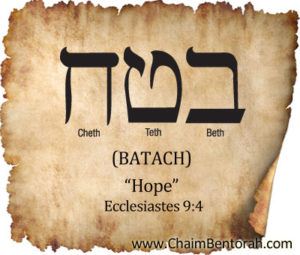HEBREW WORD STUDY – HOPE – BATACH – בטח Beth Teth Cheth
Ecclesiastes 9:4: “For to him that is joined to all the living there is hope, for a living dog is better than a dead lion.”
 “…how hard it must be to live only with what one knows and what one remembers, cut off from which one hopes for…there can be no peace without hope.” Albert Camus “The Plague.”
“…how hard it must be to live only with what one knows and what one remembers, cut off from which one hopes for…there can be no peace without hope.” Albert Camus “The Plague.”
“A living dog is better than a dead lion.” “Huh???” What the blazes does that mean?
In the first century, the school of Hillel and the House of Shammai both questioned whether the Book of Ecclesiastes should be included in the Canon as it was book filled with despair and hopelessness. It was like a primer for existentialism. It gave no meaning to life and in fact, suggested that life was worthless. It does not matter whether you are rich or poor, in the end, the rich die just like the poor and the cycle of life continues. So why work and struggle all your life and then go to a grave.
Such thoughts give rise to hedonism. In other words, you just live for the moment and find all the enjoyment you can. The Talmud, however, instructs us that Ecclesiastes is telling us that what is done under the sun is of no value as it will pass away. However, what is done above the sun will have eternal value. Our focus should be not on what will quickly pass away but on that which will continue to exist. Thus, our existence on this earth is only to prepare us for that which has eternal value. So long as we are alive we have hope.
Although there were domesticated dogs in ancient times there were more undomesticated dogs which were considered vile animals. Dogs were prone to rabies, distemper and other diseases. You get by a rabid dog and you die a common occurrence in those days. A lion was considered to be a noble animal. Yet it is better to be a vile, rabid beast and to be alive than to be a noble animal and be dead. We can envy the wealth, power and fame of Steve Jobs but he is dead and whatever he has accomplished for eternity is long past. We have a big advantage over the wealthy, accomplished and famous Jobs in that we are alive and we still can accomplish something of eternal value.
It is interesting that the word used for hope which is the central thought in this verse is the word batach. Batach is the word used for trust, security, to confide in, to cling to and to have confidence in. Hope may have worked the English of 400 years ago, but not today. Four hundred years ago it had the idea of confidence, today it means almost the opposite. Today if a mechanic tells you: “Well, I fixed your brakes, I sure hope they work” you are not going to hope in that car and drive off. What you want to hear is: “I fixed it and it will batach work. In other words, it will surely work, don’t worry about it. So the opportunity we have in being alive is to trust and to cling to something. But for what purpose? I believe the secret lies in Batch.
A living dog is better than a dead lion. Maybe you feel like an undomesticated dog in church. No one sees any value in you. You can’t sing or play an instrument. Your income is so low that your tithe is less than the widow’s might. You feel like people treat you like you have rabies, they are nice, patronizing and condescending. You wish you were like those lions, those gifted, talented rich people that everyone wants to shine up to.
But these lions too will die and they will face the same question as to the undomesticated dogs, “What did you do to prepare for eternity.” Remember the words of Shakespeare in Hamlet: “The cat will mew and the dog will have his day.” Act 5, Scene 1. No matter who you are, if you are joined to all the living you have batach the assurance that you can do something for eternity. It is not too late.







Strangely, Ecclesiastes has always spoken to me about hope, I have eternity placed in my heart, I have The Teacher to teach me, I may not understand however, like you wrote I have been given a confidence and security to trust in Him and believe. Thank you Chaim and Laura for sharing so beautifully what you are given. Shalom
You’re welcome Judi! Thank you for your kind words :)
Wonderful Hope is the foundation and reality of all faith. Hebrews 11:1 King James Version (KJV)
“Now faith is the substance of things hoped for, the evidence of things not seen.”